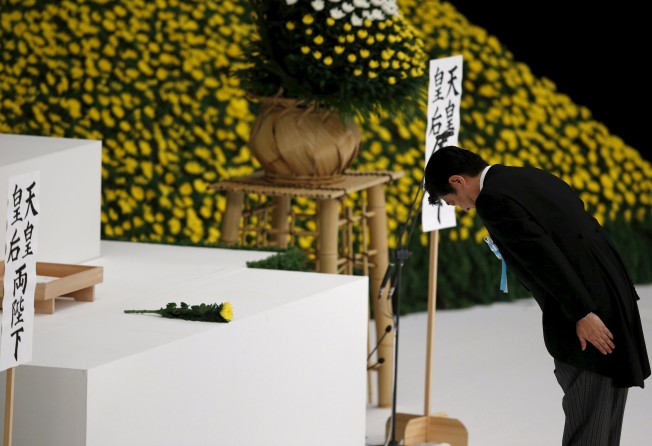Japan's war 'remorse' fuels regional doubts
Andrew Sheng says Abe needs to send a clear message of regret for atrocities of war

This year marks the 60th anniversary of the historic Bandung Conference and the 70th anniversary of the end of the second world war. To commemorate the past, a series of conferences and events have been held, the most recent being the Afro-Asian Conference hosted by Indonesian President Joko Widodo this week.
The first Bandung Conference was called by the first Indonesian president, Sukarno, in April 1955 between newly independent Asian and African nations, beginning what was later known as the Non-Aligned Movement against colonialism. Twenty-nine countries participated, representing 1.5 billion people, or just over half the world's population. It was the first time that leaders of these countries had met to discuss their future after the end of colonialism.
The conference was historic because it was attended not only by Indian prime minister Jawaharlal Nehru, but also Egyptian president Gamal Nasser, Chinese premier Zhou Enlai , Mohammed Ali of Pakistan, U Nu of Burma, Kwame Nkrumah of Ghana and Josip Tito of Yugoslavia, all giants and history-makers in the 20th century. The US did not attend because it was not sure whether it sided with the European colonial powers, in its new role as an ex-colony liberating the world.
The Bandung Conference was one of hope that the newly independent nations would build themselves into a zone of peace, prosperity and stability. On the whole, despite some failures, they succeeded.
August 6 will also mark the 70th anniversary of the atomic bombing of Hiroshima, which led to the end of the second world war on the Pacific side.
Even though memories are fading, there is still a generation that remembers the hardships and atrocities of war. Even a remote country like Australia could not escape that war. Australian soldiers fought heroically on the Kokoda Trail to repel the Japanese invasion of Papua New Guinea in 1942. If not stopped, Australia could have fallen into Japanese hands, changing the course of history.
But the 625 Australian deaths defending the Kokoda Trail paled in comparison to the Sandakan Death March, in which 2,345 Australian prisoners of war died marching from their POW camp in Sandakan across primitive jungle in Sabah, East Malaysia. Only six survived those marches in early 1945, only because they escaped.
My impressions of this incident are indelible, growing up in Sandakan and following the trail across Sabah on a road built by the Australians to commemorate their dead. It fascinated me that man could be so cruel to other human beings.
Last June, when Japanese Prime Minister Shinzo Abe addressed the Australian Parliament, he mentioned Kokoda and Sandakan but did not offer an apology - sending instead his "most sincere condolences towards the many souls who lost their lives". This was very Japanese English, because one gives condolences to the living, not the dead. In the Afro-Asian Conference this week in Bandung, he rephrased his words to say, "Japan, with feelings of deep remorse over the past war, made a pledge to remain a nation always adhering to those very principles [of Bandung] throughout, no matter what the circumstances."
He is already shifting the official Japanese view on the war from his predecessors, who both offered "deep remorse and heartfelt apology," in their statements in the 1995 and 2005 anniversaries respectively.
I have always thought that the difference between remorse and shame is one that differentiates Western and Asian values. Remorse is a feeling of regret that something happened, but there is no sense of guilt. Shame is a feeling you have injured someone and you feel guilty about it and want to make amends.
What makes Abe's "deep remorse" poignant is that he is a leader of a faction that wants to rearm Japan by changing its constitution and he has regularly visited or sent ritual offerings to the Yasukuni Shrine, which contains the remains of 14 class-A war criminals.
Most Asians like myself have great respect for Japan, but feel uneasy that Japanese are beginning to whitewash their role in the war. The Yasukuni Shrine has an accompanying museum that seems to suggest not only that the Nanking massacre did not occur, but that US actions to deny Japan energy resources pushed it into war. But these do not explain why Japan invaded China in 1937.
On the commemoration of the 70th anniversary of the end of the Pacific war, will the US leader express an apology or remorse for bombing Nagasaki or Hiroshima? If the Japanese want to understand how the rest of Asia feels about its actions during the second world war, just changing the history books will not solve the deep sense of injustice that war brought to the region. Could those who died or suffered during that period appeal to the rule of law that Abe so proudly proclaims today?
All of us want to move on, but not through denying the past. As the philosopher George Santayana said, those who cannot remember the past are condemned to repeat it.
Andrew Sheng writes on global issues from an Asian perspective